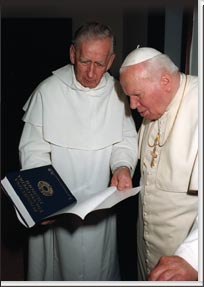Professor Mieczysław A. Krąpiec OP is one of the outstanding Polish philosophers, theologians and humanists. He's the chief creator of the Lublin School of Philosophy, which was a center of free philosophical thought in Poland at a time when Marxist ideology was striving to the utmost to dominate and enslave minds of all the people under its regime. The Lublin School of Philosophy remains one from the very few centers of realistic philosophy all over the world. Professor Krąpiec developed a coherent philosophical system to explain the whole of reality available for human cognition. His philosophy is the biggest achievement in the field of realistic and wisdom-oriented classic philosophy both in Poland and abroad in 20th century. He was an outstanding teacher who formed several generations of philosophers. Those philosophers now form a scientific circle that is developing the classical way of doing philosophy. He was the principle figure in the publication of the very first Universal Encyclopedia of Philosophy in Poland and became the chairman of the Scientific Committee for this undertaking (the publication started in 2000, with one volume planned for publication each year, and finished in 2009). He was rector of the Catholic University of Lublin during the most difficult period of the communist regime in Poland, and he had the longest term in office as reactor (for thirteen years, since 1970 up to 1983). He successfully reinforced the position of the university by affiliating it with several foreign universities; he reformed and developed its scientific structure; he worked hard to improve the university administration; he increased the university's material resources; he expanded the range of education in the university; he managed to make the Catholic University of Lublin a center of free humanistic thought for the good of Polish culture and the humanities.
He graduated from the Wincenty Pol gymnasium school in Tarnopol in 1939, and that same year he joined the Dominican Order in Kraków. During the German occupation he studied in Dominican Philosophy and Theology Institute in Kraków. He received holy orders in 1945. Between 1946 and 1954 he worked as a lecturer in the Philosophy and Theology Institute in Kraków. Under the direction of Jacek Woroniecki he wrote his doctorate thesis on philosophy under the title De naturali amore Dei super omnia in creaturis (On Natural Love of God Above All in Creatures), which was thereafter accepted by the Pontifical University of Saint Thomas, or Angelicum, in Rome in 1946. In 1948 at the Catholic University of Lublin he defended his doctoral thesis in theology, written under direction of A. Słomkowski and entitled De amore hypostatico in Sanctissima Trinitate secundum St. Thomam Aquinatem (On Hypostatic Love in the Holy Trinity According to Saint Thomas). He started to work toward the position of assistant professor in the Faculty of Theology in Warsaw University (1951), on the basis of his thesis on Existential foundation of the transcendental analogy of being, when the faculty was shut down by the communist government. Instead, he presented his thesis on the Faculty of Christian Philosophy of KUL in 1956. He obtained the position of assistant professor in 1956, the position of associate professor in 1962 and the position of professor in 1968. He was associated with the Catholic University of Lublin from 1951 onwards. He was the dean of the Faculty of Philosophy twice (1958-1961, 1969-1970). Between 1970 and 1983 he was elected to be the rector of the university five times. For thirteen years (1970-1983) he had led KUL as the rectorhe developed its academic structures, administration and material background; he intensified labor on the Catholic Encyclopedia by establishing the Inter-Faculty Lexicographical Institute; he brought the School of Polish Language and Culture into being at KUL; he set up the Institute for Priesthood and Polish Migration (1972); he reactivated the sections of Romance philology (1972) and English philology (1982); in 1982 he brought back into being the Faculty of Social Sciences with section of psychology, pedagogy and sociology (1982), and he revived the section of law within the Faculty of Canon Law and Administration (1982).
He contributed much to the revival and development of the Catholic University of Lublin, which remained the only university not administered by the State throughout the communist part of Europe in that period. He also did a great deal to promote the Catholic University of Lublin in Poland and abroad.
« back

